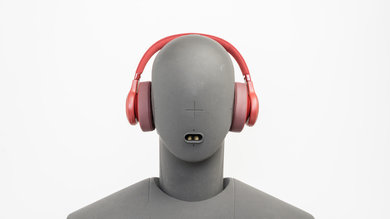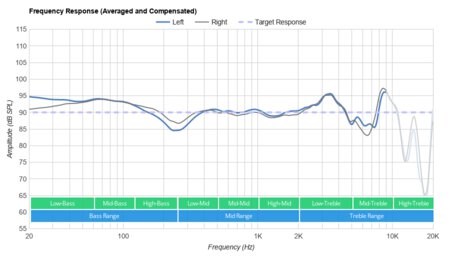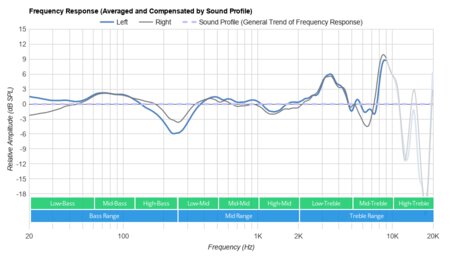The JBL Live 500BT are fairly versatile headphones that have a decent sound profile. These headphones are quite similar to the JBL E55BT, which seem to be the previous lineup before the Live series. The Live 500BT will be suitable for most music genres and have amazing battery life. Unfortunately, this model doesn’t have active noise cancelling (ANC), which means they won’t be ideal for commuting. For similar noise cancelling headphones, look at the higher-end JBL Live 650BTNC. On the upside, the Live 500BT have a good companion app that gives you access to a full parametric EQ, which allows you to customize their sound to your liking.
Our Verdict
The JBL Live 500BT are good for neutral listening. They have a powerful bass that sounds a bit thumpy, which some fans of bass-heavy genres like EDM and dubstep may prefer. Their reproduction of vocals and lead instruments in the mid-range is nearly flawless, but some may find they sound a bit thin. Their treble is a bit uneven and most of the range is over our target, which means some may find them overly sharp. However, they have a full parametric EQ available inside their app that allows you to add as many points as you want to customize their sound profile to your liking, which is great.
- Decent audio reproduction.
- Amazing battery life.
- Great full parametric EQ for audio customization.
- Sub-par noise isolation.
- Tight fit, can get uncomfortable after a while.
The JBL Live 500BT are alright for commuting. These headphones don’t have an ANC feature, which means they don’t do that great against low-end noises like the rumbling of a plane or bus engine. On the upside, they don’t leak too much so you can listen to your music at fairly high volumes, which masks a bit more ambient noise. They also have a remarkable battery life with over 30 hours of continuous playback, which will last you long enough for the longest trips, although they might get a bit uncomfortable after a while since they're very tight headphones.
- Decent audio reproduction.
- Amazing battery life.
- Great full parametric EQ for audio customization.
- Sub-par noise isolation.
- Tight fit, can get uncomfortable after a while.
The JBL Live 500BT are decent for sports. These headphones are tight and have a secure fit for over-ears, especially since they're fairly lightweight. However, they won’t be the most portable option even if they fold and swivel. They don’t come with a case, so they won’t be protected if you want to put them in your gym bag. Also, they won’t be very breathable, and you will feel a noticeable temperature difference when working out with these.
- Decent audio reproduction.
- Amazing battery life.
- Great full parametric EQ for audio customization.
- Sub-par noise isolation.
- Tight fit, can get uncomfortable after a while.
The JBL Live 500BT are fair for office use. While they don’t isolate low-end noises for commuting, they do a pretty good job at blocking work environment noises such as ambient chatter and A/C noise. You’ll also be able to play your music at high volumes without distracting surrounding colleagues. Their battery life will last you a few workdays without having to charge them and they’ll be comfortable to wear for a while, but you might need to take some breaks here and there due to their tightness.
- Decent audio reproduction.
- Amazing battery life.
- Great full parametric EQ for audio customization.
- Sub-par noise isolation.
- Tight fit, can get uncomfortable after a while.
The JBL Live 500BT are sub-par for gaming. These headphones’ Bluetooth latency will be too high for gaming and their integrated microphone won’t have the best recording quality for online multiplayer games. You can improve their performance by using them wired, which gets rid of the latency, and use their in-line mic, which we expect to perform slightly better. However, it won’t rival the voice recording quality of a gaming headset’s boom microphone.
- Decent audio reproduction.
- Amazing battery life.
- Great full parametric EQ for audio customization.
- Sub-par noise isolation.
- Tight fit, can get uncomfortable after a while.
- Decent audio reproduction.
- Amazing battery life.
- Great full parametric EQ for audio customization.
- Sub-par noise isolation.
- Tight fit, can get uncomfortable after a while.
Changelog
- Updated Aug 11, 2021: Converted to Test Bench 1.5.
- Updated Feb 07, 2020: Converted to Test Bench 1.4.
- Updated Nov 21, 2019: Converted to Test Bench 1.3.1.
- Updated Nov 21, 2019: Converted to Test Bench 1.3.
Check Price
Popular Headphones Comparisons
The JBL Live 500BT are decent over-ear headphones that perform fairly well in most of our tests but don’t necessarily excel in anything in particular. For their intended use and value, they're a decent and versatile option. However, they do lack an ANC feature for commuting, which is available on other similar models.
See our recommendations for the best headphones, the best noise cancelling headphones under $200, and the best headphones under $200.
The JBL Live 650 BTNC are a slightly high-end pair of headphones that are very similar to the JBL Live 500BT Wireless, but they have an ANC feature, which makes them more suitable for public transit. Design-wise, the 650 BTNC are also a bit more comfortable thanks to their padding. They have similar sound profiles, and both have access to the same great parametric EQ. On the other hand, since the Live 500BT don’t have an ANC, they require less power and have noticeably better battery life than the 650BTNC.
The JBL Live 500BT are sort of a newer version of the JBL E55BT Wireless and perform better. They feel better built, and the folding joints are now metal, which don't feel like they might break. They also have noticeably better battery life, with about twice the life of the E55BT. They are also compatible with the JBL Headphones app, which gives you access to a great parametric EQ, while the E55BT don’t have any customization options. The wireless range also improved on the Live 500BT.
Even if the JBL E65BTNC Wireless are from an older lineup, they are still better-performing headphones than the JBL Live 500BT Wireless. They have a decent ANC feature that is suitable for commuting. While the headphones look fairly the same and also have similar sound profiles, the better isolation performance of the E65BTNC make them a better choice. However, if you don't use your headphones while commuting, the longer battery life of the Live 500 might be worth it for some, especially since you can also have access to the JBL Headphones app and a great parametric EQ, which the E65BT lack.
The JBL Live 500BT have a very small edge over the Sennheiser HD 4.40 BT Wireless. They feel slightly better-built and less plasticky, and their sound quality is slightly better as it doesn’t lack as much detail in the treble range as the Sennheiser. You also get about 10 extra hours of battery life with the JBL. Their audio cable also features an in-line microphone, which the Sennheiser are lacking. However, the Sennheiser support NFC pairing and have lower latency, which is better suited for watching video content without any delay.
Test Results


The JBL Live 500BT are fairly stylish headphones and are practically identical to the JBL Live 650BTNC. The cups are large and have thick padding, while the headband has a mesh coating, which seems to be a recurring design choice for the JBL headphones. They look like premium headphones, although they're mostly made of plastic. They come in different monochromatic styles such as black, navy, green, red, and white.

The JBL Live 500BT are fairly comfortable over-ear headphones but aren’t quite on par with the JBL Live 650BTNC. Their padding is a bit stiffer and they're very tight on the head, which may be even more uncomfortable for people with larger-sized heads. The cups are also small and a bit shallow; some may feel their ears touching the drivers. On the upside, the headband is decent and distributes the weight of the headphones well.

These headphones have a decent control scheme, with physical buttons that are fairly easy to use and offer common functionalities. You have control over your calls, music, and volume, on top of being able to skip tracks. You can also cycle through their talk-through mode and the ambient mode, or disable both. You can also cover the left cup with your palm to easily trigger your voice assistant, which you can also do by double tapping the middle multi-purpose button.
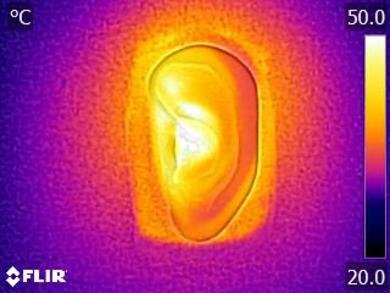
Like most over-ears, the JBL Live 500BT trap a decent amount of heat under their ear cups. These headphones are very tight and create a good seal around your ears, which obstructs airflow. Working out with these won’t be ideal and most people will sweat more than usual when using them for sports.

Like most over-ears, the JBL Live 500BT are quite bulky. On the upside, they do fold into a more compact format and their cups also swivel to lay flat. This makes it easier to wear them around your neck or to slide in a bag. Unfortunately, they don’t come with a case to protect them when you’re on the move. For a smaller variant, take a look at the JBL Live 400BT on-ear headphones.

These headphones are well-built and feel a bit more solid than the JBL E55BT Wireless. The folding joints are made out of metal and don't give a cheap feel when folding the cups. Also, the cups feel fairly dense and shouldn’t break from accidental drops. The headband is also reinforced with a thin metal sheet. They're built the same way the JBL Live 650BTNC are with a similar polished look.

Since they're quite tight on the head, they can be stable enough for a run. Also, you shouldn’t have any problems during casual listening sessions, but they might wobble around a bit when doing intense sports. On the upside, their wireless design means you won’t have any cables in your way, and it can’t yank the headphones off your head if they were to get stuck or hooked on something.

- JBL Live 500BT headphones
- 1/8” TRRS audio cable with in-line remote and mic
- USB to micro-USB charging cable
- Manuals
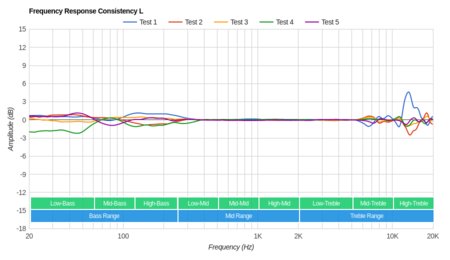

The JBL Live 500BT have decent frequency response consistency. The headphones seemed to perform quite consistently across most of our human test subjects, but only one experienced a noticeable drop in bass. This may be due to the amount of hair between the cup and the skin, creating a break in the seal. On the upside, they perform very consistently in the treble range in between different reseats.
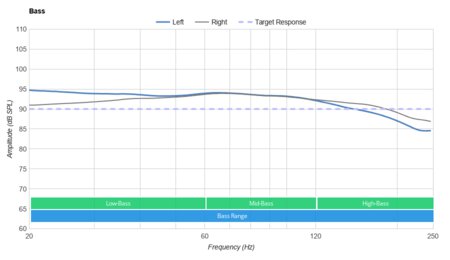
The bass performance of the JBL Live 500BT is great. Their LFE (low-frequency extension) is down to 10Hz, which is excellent. The 4dB overemphasis in the low-bass results in a bass that has a bit excess thump and rumble, but fans of bass-heavy music may prefer this. The mid-bass, responsible for the kick of drums and body of bass guitars, is also slightly over our target curve. However, there’s a small dip in high-mid, which could thin out the bass a bit.

The JBL Live 500BT’s mid-range is also great. There’s a small underemphasis in low-mid, which thins out the vocals and lead instruments a bit, but this won’t be very audible to most people. Also, the rest of the response is virtually flawless throughout the range, resulting in an accurate reproduction of vocals and leads.
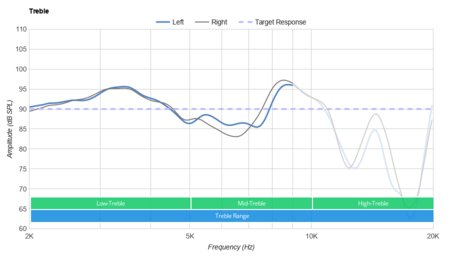
The treble performance of the JBL Live 500BT is good. However, the response is slightly uneven and may sound overly bright and piercing, especially on already bright tracks. On the other hand, there’s a dip centered around 6kHz, which will negatively affect the detail and brightness of those frequencies. However, not everyone hears treble frequencies the same way, so your experience may vary.
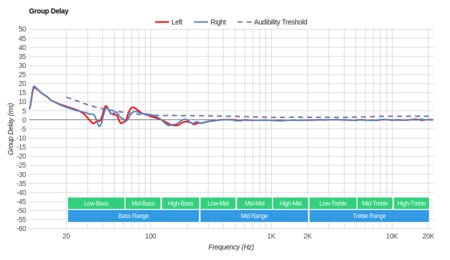
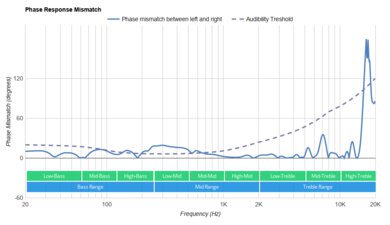
The stereo imaging performance is great. The weighted group delay is at 0.46, which is within good limits. The GD graph also shows that the group delay response is almost entirely below the audibility threshold. This ensures a tight bass and a transparent treble reproduction. Additionally, the L/R drivers of our test unit were well-matched, which is important for the accurate placement and localization of objects (instruments, voice, footsteps), in the stereo image. However, they had a small frequency mismatch, which seems to be mostly in low-bass, which shouldn’t be too noticeable. Note that these results are only valid for our test unit, and yours may perform differently.

They have a sub-par soundstage. The PRTF response graph shows that the JBL Live 500BT don't activate the resonances of the pinna (outer ear) much, which is one of the big factors in creating a speaker-like soundstage. There’s also no notch present around the 10kHz region. This and their closed-back design suggest a soundstage that is small, unnatural, and should be perceived to be located inside the listener's head, as opposed to in front.
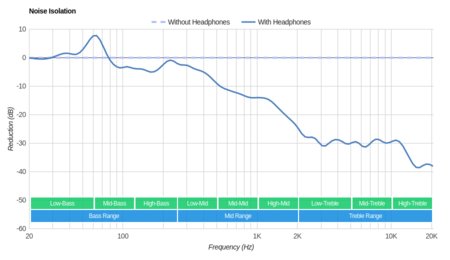
The JBL Live 500BT have sub-par isolation. These headphones don't have active noise cancelling and isolate only using their fit around your ears. In the bass range, occupied by the rumble of airplane and bus engines, they achieve no isolation, which means they won’t be the best option for your daily commute. In the mid-range, important for blocking speech, they achieve 12dB of reduction which is decent. In the treble range, occupied by sharp S and T sounds, they isolate by 31dB, which good, especially against A/C system noise. For noise cancelling headphones similar to these, take a look at the JBL Live 650BTNC.
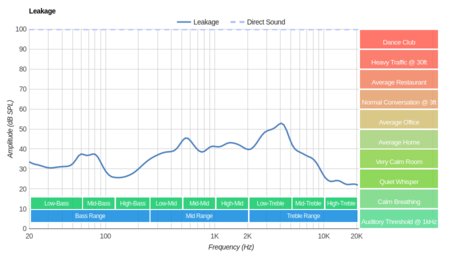
The leakage performance is good. The significant portion of leakage sits between 400Hz and 5kHz, which is a relatively broad range. This results in a leakage that sounds fuller and more comprehensible than the leakage of in-ears and earbuds, but not as much as open-back headphones. However, the overall level of leakage is not too loud. With the music at 100dB SPL, the leakage at 1 foot away averages at 37dB SPL and peaks at 53dB SPL, which is around the noise floor of most offices.
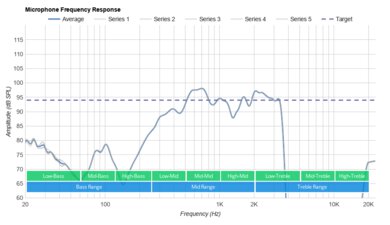
The recording quality of the integrated microphone is sub-par. LFE (low-frequency extension) is at 392Hz, which means transmitted/recorded speech with this mic will sound noticeably thin. The HFE (high-frequency extension) of 3.4kHz indicates speech that lacks detail and is noticeably muffled. This will have a negative effect on the intelligibility of speech, but it should still be understandable in quiet environments.

The integrated mic is mediocre at noise handling. In our SpNR test, it achieved a speech-to-noise ratio of 12dB, indicating the mic is best suited for quiet environments and will struggle to separate speech from ambient noise in moderate and loud situations.
The JBL Live 500BT have great battery life. We measured about 37 hours of continuous playback on a single charge, which is slightly over the advertised 33 hours. This should be more than enough for a few workdays and won’t need daily charging, which is great. They also took less than two hours to charge fully, which is good. The headphones can also automatically turn off after 10 minutes to save power, but you can also disable this feature inside their app. Unfortunately, as soon as you plug in their charging cable, they turn off, meaning you can’t use them while charging. However, you can use them passively even if the battery is dead, which is convenient.

The JBL Live 500BT are compatible with the JBL Headphones app. The available features resemble what you can find with the JBL Live 650BTNC, minus the ANC control. However, you get two buttons to cycle between talk-through and ambient modes. The full parametric EQ is also great, allowing you to add as many points as you want and fully customize their sound profile. Unfortunately, it lacks a few features like playback control or some room effects, but overall this app is still a good tool to help enhance your listening experience.
Update 12/09/2021: These headphones were updated to Test Bench 1.5 and their latency values have changed. As a result, we have updated our text to better reflect test bench 1.5 measurements.
The JBL Live 500BT are Bluetooth compatible and can be connected to two devices simultaneously. This means you can easily switch between a work computer and your phone seamlessly, which is convenient. Unfortunately, they don’t support NFC for a quicker and easier pairing procedure. They also have high latency on PCs as well as iOS and Android devices, which may result in a delay between your audio and visuals. On the upside, some devices and apps seem to offer some compensation, so you may not notice it as much. You can also use them on a wired connection with their included audio cable to completely get rid of the latency.
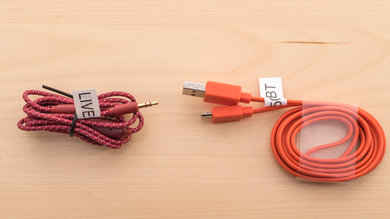
The JBL Live 500BT can be used with their included 1/8” TRRS cable to support both audio and the in-line microphone on platforms that have the appropriate jack, like a console controller, a PC, or a phone. Some might need a Y-adapter to use both the headphones and microphone ports on a desktop. Also, they don’t support audio over their USB charging cable.



